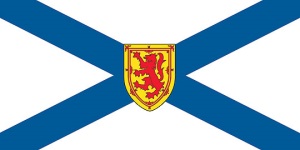Gaelic Language Revitalization in Nova Scotia Reaches Tipping Point - Provincial Government Confirms Support for the Celtic Tongue
Canadian media report that Randy Delorey, minister of Gaelic Affairs, revealed a new Gaelic Language license plate at a ceremony Tuesday to mark the 22nd annual Gaelic Nova Scotia Month. “The plate -- which includes the province's Gaelic name, Alba Nuadh -- will be made available for purchase later in May, with proceeds going to Gaelic language and culture initiatives. “This will allow more people to reconnect with their language, culture and heritage and to preserve these for the next generation," Delorey said at Province House. It’s part of Gaelic Affairs of Nova Scotia's effort to raise cultural awareness and the number of Gaelic speakers in the province, said David Rankin, president of the Gaelic Council of Nova Scotia. “There is a third of the province that has Gaelic ancestry and there are many people who want to learn and want to engage in our culture," Rankin said in an interview.” – CTV NEWS
In 1850 the Scots Gaelic community of Nova Scotia is estimated by some to have exceeded 100, 000 Gaelic speakers. The malign neglect of the Provincial and Canadian governments failed to give Gaelic the same rights and recognition as that afforded English. It was the de facto policy of assimilation which was lethally effective against the Scottish language. For example, Gaelic was never the language of instruction in the Cape Breton school system despite the significant presence of the Gaelic speaking community. The result has been the steady decline of the language. By 1930, just 80 years after the 1850 census showed over 100,000 speakers, the number of Gaelic users in Nova Scotia had fallen to just 30,000.
Today over a dozen public institutions offer Gaelic courses, (such as a Canadian History course in Gaelic at North Nova Education Centre, Nova Scotia) in addition to advanced programmes conducted at Cape Breton, St. Francis Xavier and Saint Mary’s. The Nova Scotia Highland Village offers a bilingual interpretation site, presenting Gaelic and English interpretation for visitors and offering programmes for the local community members and the general public. The Gaelic College in St. Ann’s offers Gaelic immersion weekends, weeks and summer programs. Sponsored by local Gaelic organizations and societies, ongoing Gaelic language adult immersion classes involving hundreds of individuals are held in over a dozen communities in the province. These immersion programs focus on learning language through activity, props and repetition. Reading, writing and grammar are introduced after the student has had a minimum amount of exposure to hearing and speaking Gaelic through everyday contextualized activities. The grouping of immersion methodologies and exposure to Gaelic cultural expression in immersion settings is referred to in Nova Scotia as Gàidhlig aig Baile. - Wiki
Guarded optimism for the future of the language and culture of Gaelic Nova Scotia is a theme of the landmark study published in 2002 by the Nova Scotia Museum which is entitled “Gaelic Nova Scotia – An Economic, Cultural and Social Impact Study” (Curatorial Report #97) , written by Michael Kennedy. A commanding work of over 300 pages which surveys the historical context of Scottish immigration to Nova Scotia and the Gaelic institutions in Nova Scotia working to preserve and promote the Celtic tongue and culture of the province at the time of publication. In addition, Kennedy’s work goes into an expansive analysis of the unique Gaelic music and dance of the province and ends with an outline of a practical plan for the revitalization of the culture and the language.
In 2018 the Province of Nova Scotia estimate that there are 2,000 Gaelic speakers, concentrated in Cape Breton, representing a dramatic increase in recent years. " Efforts to address the decline of Gaelic language in Nova Scotia began in the late 1980s. Two conferences on the status of Gaelic language and culture held on Cape Breton Island set the stage. Starting in the late 1990s, the Nova Scotia government began studying ways it might enhance Gaelic in the province. In December 2006 the Office of Gaelic Affairs was established." Wiki

https://www.transceltic.com/scottish/nova-scotia-edge-of-celtic-world
https://www.ctvnews.ca/canada/nova-scotia-unveils-gaelic-licence-plate-a...
http://www.cbc.ca/news/canada/nova-scotia/nova-scotia-gaelic-licence-pla...






